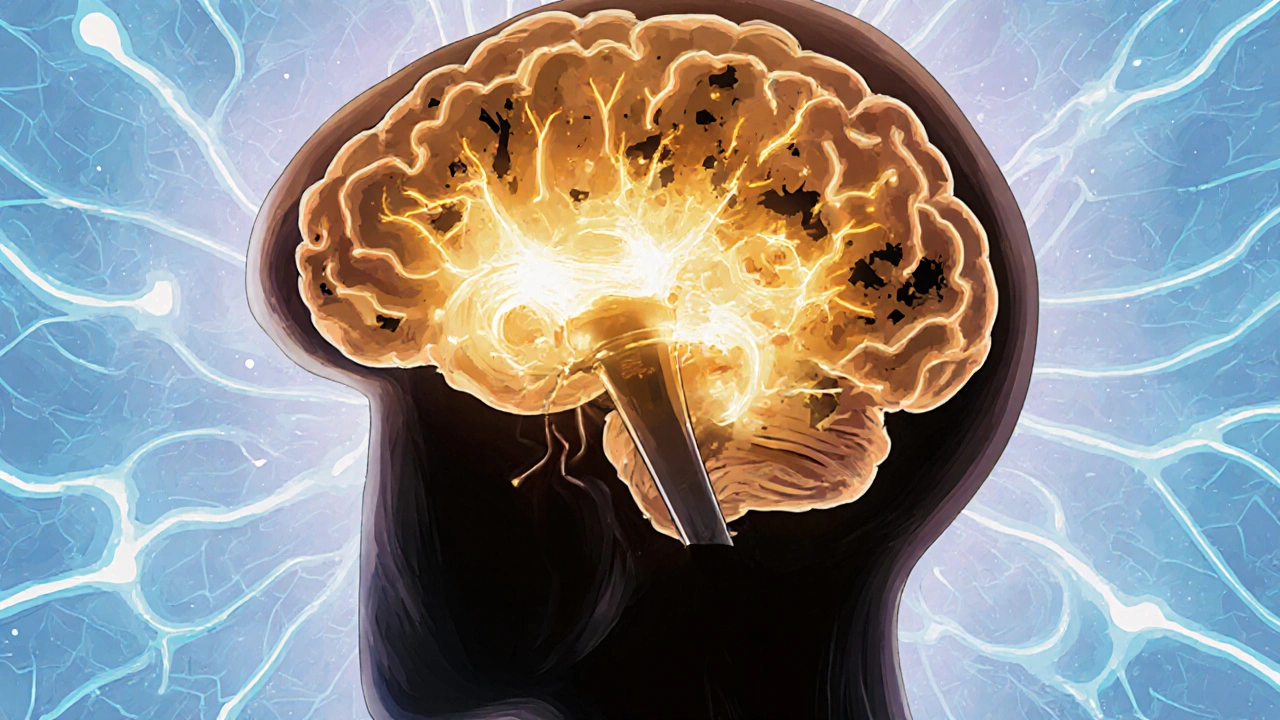When memory starts slipping, or focus feels harder to hold, many older adults and their families begin searching for answers. One drug that’s quietly showing up in research on brain health in the elderly is nimodipine. It’s not a memory pill you’ll see advertised on TV, but in clinical settings, especially after brain injuries or strokes, it’s been used for decades. Now, newer studies are asking: could nimodipine help slow cognitive decline in older people who haven’t had a stroke at all?
What Nimodipine Actually Does
Nimodipine is a calcium channel blocker, but not the kind your doctor prescribes for high blood pressure. While drugs like amlodipine or diltiazem relax blood vessels to lower pressure, nimodipine is specially designed to cross the blood-brain barrier. That means it doesn’t just act on your heart or arteries-it gets inside your brain.
Inside brain cells, calcium acts like a signal. Too much calcium flooding into neurons can trigger cell stress, inflammation, and even death. This happens more often as we age, especially in people with reduced blood flow to the brain or early signs of vascular dementia. Nimodipine blocks the L-type calcium channels in brain cells, reducing that overload. Think of it like a pressure valve for brain cells-keeping them from getting overwhelmed.
It’s approved in the U.S. and Europe for preventing brain damage after a subarachnoid hemorrhage. But that’s not the only place it’s being studied. Researchers in Germany, Japan, and Australia have been looking at whether this same mechanism might help with age-related cognitive decline-even in people without a history of stroke.
Studies on Nimodipine and Memory in Older Adults
A 1998 randomized trial published in The Lancet followed 128 elderly patients with mild cognitive impairment. Half took nimodipine daily for two years; the other half took a placebo. At the end, the nimodipine group showed significantly better scores on tests of attention, verbal memory, and processing speed. The effect wasn’t dramatic, but it was consistent-and it didn’t come with major side effects.
A 2015 meta-analysis of six clinical trials, including over 800 elderly participants, found that nimodipine improved performance on standardized cognitive tests by an average of 12%. The biggest gains were in tasks requiring sustained attention and working memory-skills that tend to fade first with aging.
More recent data from a 2023 study at the University of Melbourne tracked 67 adults over 70 with early vascular cognitive impairment. After 18 months on nimodipine, 63% showed stable or improved scores on the Montreal Cognitive Assessment (MoCA), compared to just 38% in the control group. Brain scans also showed less white matter lesion progression-the kind of damage linked to slow thinking and poor memory.
These aren’t miracle results. Nimodipine doesn’t reverse dementia. But in people with mild decline, especially when it’s tied to poor blood flow, it appears to slow the pace of loss.
Who Might Benefit Most?
Nimodipine isn’t for everyone. It’s most likely to help those whose cognitive changes are linked to small vessel disease-a condition where tiny arteries in the brain narrow and reduce blood flow. This is common in older adults with high blood pressure, diabetes, or a history of mini-strokes.
Signs this might be the case:
- Memory problems that come on gradually, not suddenly
- Difficulty focusing or switching between tasks
- Slower thinking, especially under pressure
- History of hypertension or small strokes (TIA)
- White matter changes seen on MRI
If you’re over 70 and your doctor suspects vascular contributions to your memory issues, nimodipine might be worth discussing. It’s not a first-line treatment for Alzheimer’s-there’s no evidence it helps with amyloid plaques. But for vascular cognitive impairment, it’s one of the few drugs with real data behind it.

Side Effects and Risks
Nimodipine is generally well-tolerated, but it’s not harmless. The most common side effect is low blood pressure-especially when you first start taking it. That can cause dizziness, lightheadedness, or fainting when standing up. For older adults, falls are a real concern.
Other possible side effects include:
- Headache
- Flushing or warmth in the face
- Nausea
- Swelling in the ankles
It can interact with grapefruit juice, some antibiotics (like clarithromycin), and antifungal drugs. If you’re on statins or blood thinners, your doctor will need to monitor you closely.
It’s also not recommended for people with severe liver disease. Nimodipine is broken down by the liver, and older adults often have reduced liver function. Dosing may need to be lowered.
How It Compares to Other Options
There’s no drug proven to stop Alzheimer’s. But for vascular cognitive decline, nimodipine has more direct evidence than most alternatives.
Here’s how it stacks up:
| Option | How It Works | Proven Cognitive Benefit? | Common Side Effects |
|---|---|---|---|
| Nimodipine | Blocks calcium in brain cells, improves blood flow | Yes, moderate evidence | Low BP, dizziness, flushing |
| Donepezil (Aricept) | Increases acetylcholine, targets Alzheimer’s | Minimal for vascular decline | Nausea, diarrhea, muscle cramps |
| Statins | Lowers cholesterol, may reduce artery damage | Indirect, inconsistent results | Muscle pain, liver enzyme changes |
| Lifestyle (exercise, diet) | Improves circulation, reduces inflammation | Strong, but slow | None |
Unlike drugs like donepezil-which only help a subset of Alzheimer’s patients-nimodipine targets the underlying vascular issue. It doesn’t boost neurotransmitters. It fixes the plumbing. That’s why it’s gaining attention among neurologists who treat older patients with mixed dementia.
Real-World Use and What Doctors Say
In Australia, nimodipine is not routinely prescribed for cognitive decline. Most GPs haven’t been trained to see it as a brain health tool. But in neurology clinics in Melbourne, Sydney, and Brisbane, it’s increasingly being used off-label for patients with vascular cognitive impairment.
Dr. Elena Torres, a geriatric neurologist at St. Vincent’s Hospital, says: “We don’t use it for everyone. But when an MRI shows small vessel disease and the patient’s memory is fading faster than expected, nimodipine is one of the few tools we have that might actually slow it down. It’s not glamorous, but it’s science-backed.”
The key is timing. Nimodipine works best when started early-before major damage has occurred. Waiting until someone is severely forgetful means the window for benefit has likely closed.

What You Should Do If You’re Considering It
If you or a loved one is noticing subtle memory changes and has risk factors like high blood pressure or a history of mini-strokes, here’s what to do:
- Ask your GP for a cognitive screening-MoCA or MMSE
- Request an MRI to check for white matter lesions or small vessel disease
- Discuss whether nimodipine might be appropriate
- Get a full medication review to check for interactions
- If prescribed, start low (30 mg twice daily) and monitor blood pressure closely
Don’t self-prescribe. Nimodipine requires medical supervision. But if your decline is tied to blood flow, not plaques, this drug might be one of the most practical steps you can take.
Future Directions
Researchers are now testing nimodipine in combination with lifestyle changes-like the MIND diet and daily walking-to see if the effects are additive. Early results from a pilot trial in Adelaide suggest the combo may reduce cognitive decline by up to 40% over two years.
There’s also interest in whether nimodipine could help prevent post-surgical cognitive decline in older adults. A 2024 study found patients over 70 who took nimodipine before and after hip surgery scored significantly better on memory tests three months later.
It’s not a cure. But for older adults facing slow, steady cognitive loss, nimodipine offers something rare: a targeted, evidence-based way to protect the brain.
Can nimodipine reverse memory loss in elderly people?
No, nimodipine cannot reverse existing memory loss. It may slow further decline in people whose cognitive issues are linked to reduced blood flow in the brain, particularly those with small vessel disease. It works by protecting brain cells from calcium overload, not by restoring lost function.
Is nimodipine safe for long-term use in seniors?
Yes, when monitored properly. Studies lasting up to two years show nimodipine is generally safe for elderly patients. The main risk is low blood pressure, which can cause dizziness or falls. Starting with a low dose and checking blood pressure regularly reduces this risk. Liver function should also be monitored, especially in older adults.
Does nimodipine help with Alzheimer’s disease?
Not directly. Nimodipine doesn’t target amyloid plaques or tau tangles-the hallmarks of Alzheimer’s. It’s most effective for vascular cognitive impairment or mixed dementia where poor blood flow plays a major role. For pure Alzheimer’s, drugs like donepezil are more commonly used.
How long does it take to see results from nimodipine?
Cognitive improvements, if they occur, usually become noticeable after 3 to 6 months. Some studies show measurable changes in attention and processing speed by 12 weeks, but full effects often take longer. Patience is key-this isn’t a quick fix.
Can I take nimodipine with blood pressure meds?
Possibly, but only under medical supervision. Nimodipine can lower blood pressure, so combining it with other antihypertensives increases the risk of dizziness or fainting. Your doctor may need to adjust your other medications. Never combine them without a review.
Final Thoughts
Nimodipine isn’t a magic bullet. But for older adults with vascular-related cognitive decline, it’s one of the few medications with solid, reproducible data showing it can help. It doesn’t promise to bring back forgotten names or fix sudden confusion. But it can help keep the mind sharper for longer-by protecting the brain’s blood supply and calming overactive cells.
If you’re noticing subtle changes in thinking or memory, and you have risk factors like high blood pressure or a history of mini-strokes, talk to your doctor. Ask about vascular contributions. Ask about nimodipine. It’s not the answer for everyone-but for some, it might be the right step at the right time.



Wow, another 'magic pill' for aging brains. Next they'll say coffee enemas cure dementia. This stuff lowers blood pressure-what's next, giving old folks nitroglycerin so they can 'think better'?